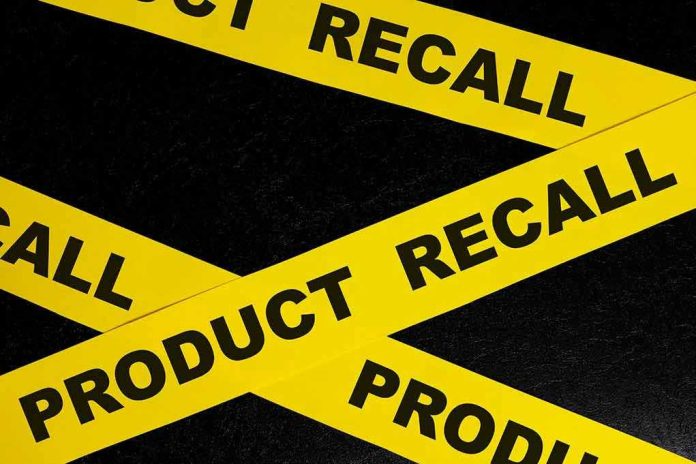
Nearly five million pounds of American chicken have been yanked from store shelves due to metal contamination—an alarming breakdown in basic food safety that puts families at risk and exposes the limits of federal oversight.
Story Snapshot
- Hormel recalls 4.9 million pounds of ready-to-eat chicken over possible metal fragments, one of the largest recalls in recent years.
- USDA investigation triggered by consumer complaints; no injuries reported as of October 27, but risk remains.
- Major retailers nationwide have pulled affected products; Hormel promises reforms in equipment checks and employee training.
- Recall highlights ongoing concerns about corporate responsibility, regulatory enforcement, and supply chain integrity in the U.S. food industry.
Massive Hormel Recall Sparks Nationwide Food Safety Fears
Hormel Foods Corporation, a household name in American groceries, has issued a massive recall of approximately 4.9 million pounds of ready-to-eat chicken products following reports of contamination with metal fragments. The recall, announced in late October 2025, came after multiple consumer complaints and a rapid investigation by the U.S. Department of Agriculture’s Food Safety and Inspection Service (FSIS). Products distributed under Hormel and Valley Meats brands are affected, and the scale of the recall makes this one of the largest safety incidents in recent memory. For conservative Americans who value personal responsibility and family safety, this event is a stark reminder of how quickly corporate and regulatory failures can threaten the integrity of the food supply.
Consumer complaints began surfacing on October 23, 2025, when individuals found foreign objects in their purchased chicken products. The next day, FSIS initiated an investigation and contacted Hormel Foods, prompting a swift internal review. By October 25, Hormel voluntarily recalled the affected products, and the recall was publicly announced by FSIS on October 26. Major retailers, including Walmart and Kroger, responded by pulling the contaminated items from shelves nationwide, reflecting the seriousness of the situation and the ripple effects throughout the food distribution network. The recall’s magnitude and the risk of metal fragments highlight the necessity of robust oversight in mass food production.
Regulatory Oversight and Corporate Accountability Under Scrutiny
Hormel’s recall is not an isolated incident—large-scale recalls due to foreign object contamination have plagued the industry before, with Tyson Foods and Perdue Foods recalling millions of pounds of chicken in recent years. These events often result in financial losses, regulatory fines, and lasting damage to brand reputation. The contamination likely arose during mechanical processing or packaging, when equipment malfunction allowed metal fragments into finished products. While the U.S. food industry operates under strict safety regulations, high-volume production increases the risk of such failures. Conservative Americans have long argued for honest, efficient oversight rather than bureaucratic overreach, yet incidents like this show that even existing safeguards can fall short, threatening consumer safety and confidence.
Hormel, facing intense scrutiny, issued a public apology and outlined corrective measures. The company promised enhanced equipment inspections and comprehensive employee retraining to prevent future incidents. FSIS continues to monitor compliance and investigate the root cause of the contamination. As of October 27, no injuries have been confirmed, but the ongoing recall and investigation highlight the importance of swift, transparent action—values central to responsible governance and corporate stewardship. The scale of this recall demands a serious reevaluation of safety protocols not just at Hormel, but across the industry.
Economic, Social, and Political Fallout
The short-term impact is immediate: consumers face the risk of injury, product shortages disrupt families and businesses, and Hormel must bear the financial cost of the recall, product disposal, and potential lawsuits. In the long-term, the company risks erosion of brand trust and heightened regulatory scrutiny that may lead to new penalties and operational changes. Retailers lose sales and customer confidence, employees face increased workloads and retraining, and shareholders may see a hit to stock value. Economically, these consequences cascade throughout the supply chain, while socially, public concern over food safety intensifies. Politically, the recall may fuel calls for stricter food safety regulations—a move that often leads to more government intervention, something many conservatives view with skepticism. The broader food industry is now on notice, with producers likely to face more frequent inspections and demands for improved traceability and quality control.
Hormel recalls 4.9M pounds of chicken possibly 'contaminated with pieces of metal' https://t.co/GepZiqKJlA #FoxBusiness
— CallieBenson (@CallieforTrump) October 27, 2025
Experts in food safety stress the importance of robust metal detection systems and regular equipment maintenance to prevent such incidents. Regulatory analysts note that recalls of this scale often prompt industry-wide improvements, but also warn that overregulation can stifle innovation and burden businesses. Dr. Sarah Klein, from the Center for Science in the Public Interest, points out that disruptive recalls are evidence the system is working to protect consumers. However, Professor James Roberts of the University of Minnesota cautions that the magnitude of the Hormel recall indicates a systemic issue, not just an isolated error. Consumer advocates push for tougher penalties and mandatory reporting, while industry groups emphasize the need for balanced, effective solutions.
Sources:
Hormel Foods Recall – Chicken Contamination Alert
Hormel recalls nearly 4.9 million pounds of frozen chicken
Hormel recalls 4.8 million pounds of ready-to-eat frozen chicken products







